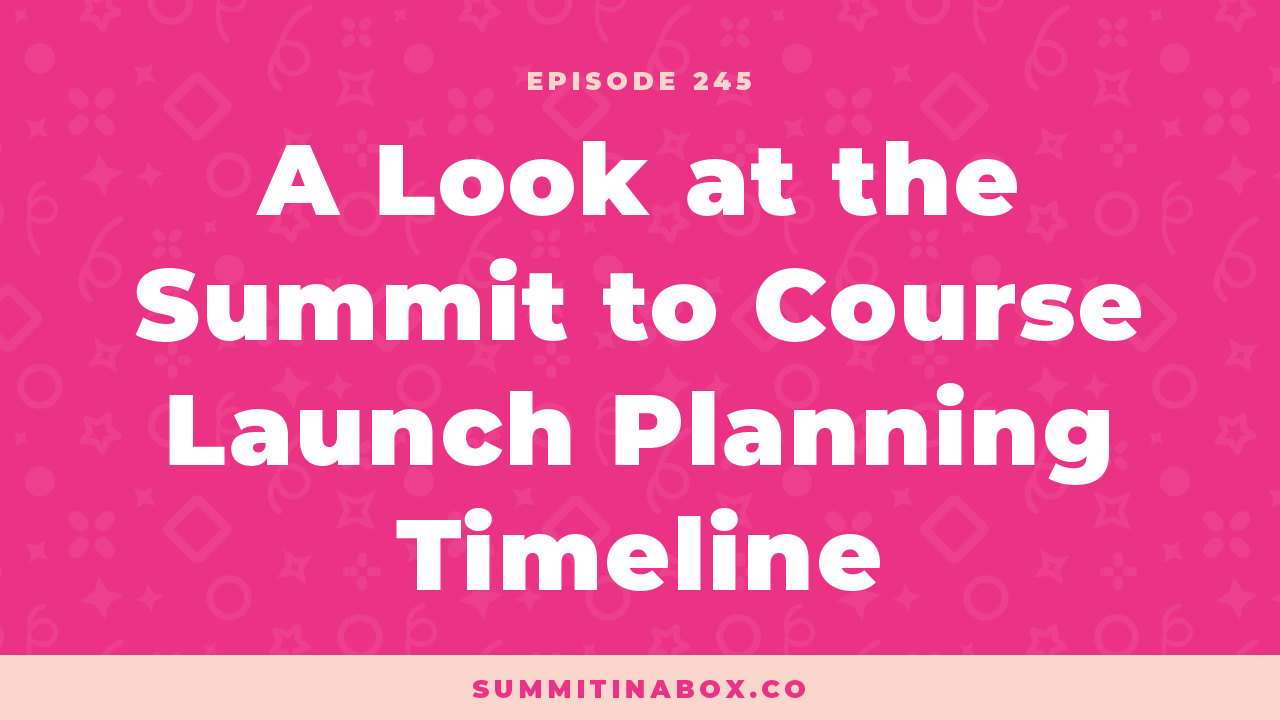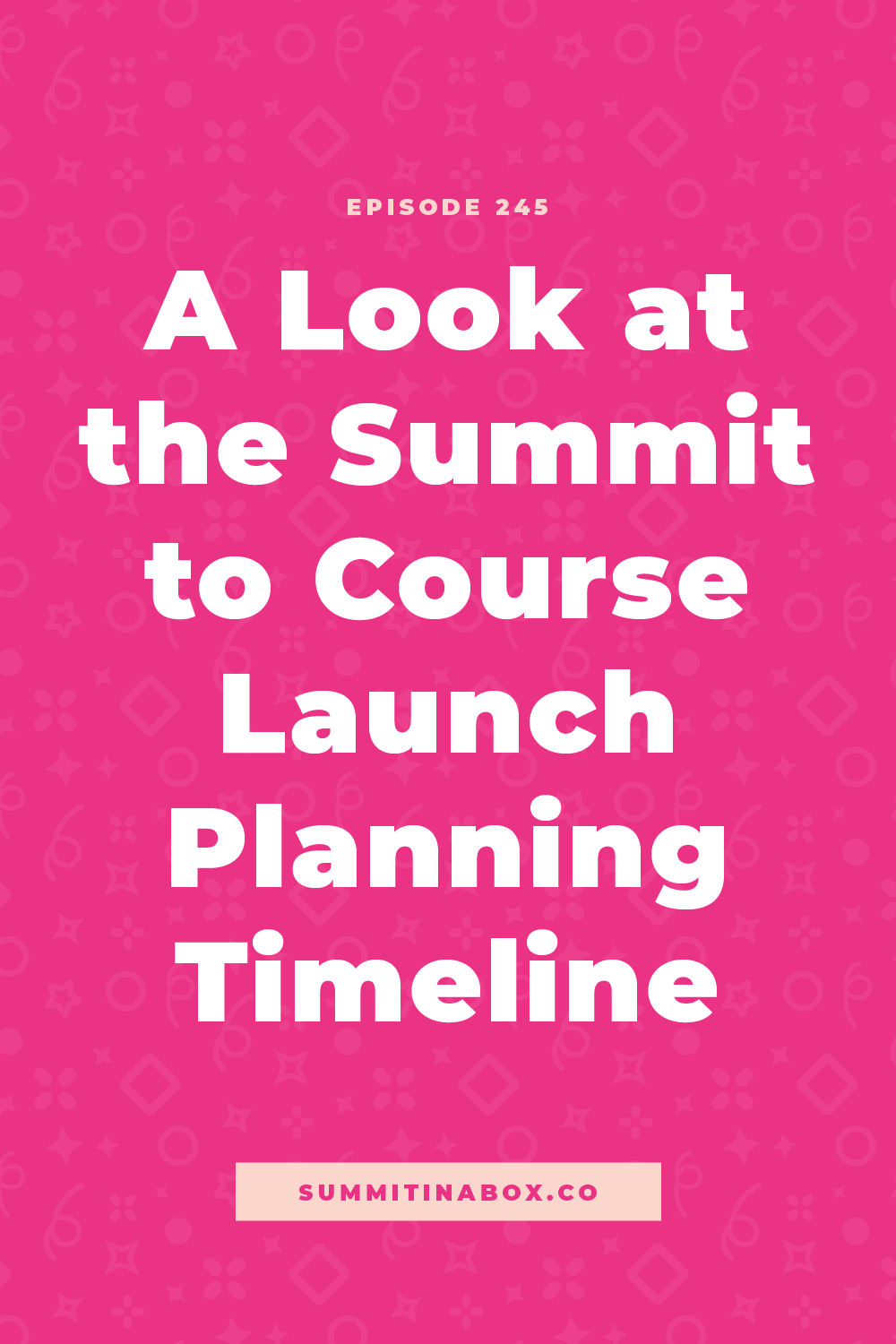A Look at the Summit to Course Launch Planning Timeline


"How long does it take to plan a virtual summit?"
This is a question I hear all the time and as much as people tend to dislike my answer, I stand by it.
Whether you're hosting a summit as a stand-alone event or adding an offer launch on the backend, it's a time investment that is so worth it.
We’ve been chatting about how to choose which of your offers to launch through your summit and the best types of offers to launch in the last few episodes, so I'm going to assume that you now know what you want to launch through your summit. And if you don’t, just DM me on Instagram and we’ll chat about it!
But for now, talk about the summit to course launch planning timeline, including...
- what the ideal summit-to-launch timeline looks like
- where there's some flexibility
- where it's not worth trying to speed things up
- what to do if you speed it up anyways
Let's dive right in!
Listen to the episode
The Ideal Summit-to-Launch Timeline
The short answer:
- If you're only planning a summit without launching, give yourself 90 days.
- If you're launching a proven offer on the backend of your summit, give yourself 120 days.
Now let's talk about why I recommend that length, and then I'll give an overview of what that timeline should look like.
I know there are a lot of you who are going to want to host your summit a whole lot faster, but hear me out. I'm 100% a quick starter. When I have an idea, I want it to be done yesterday, but I've also learned that there's nothing that makes me more stressed out or have negative feelings towards a project, than rushing it. I hate feeling like I can't give it the attention it deserves or feeling like I'm being taken away from my family or free time.
Why You Should Plan Extra Time
If you like big projects or connecting with people, this can be a very fun process. (And you can outsource the things you don't enjoy as much.)
Here are a few reasons why I recommend this timeline:
- Giving yourself that time allows you to enjoy the process!
- You'll have extra time built-in for the things that inevitably come up such as taking longer than expected to line up speakers.
- You're giving yourself room to be creative in the process.
- You're able to treat your speakers well and give them time to give you their best results.
- It means no cutting corners in your summit planning.
- And giving each piece plenty of time means you'll have the best possible results.
The performance of your summit is dependent on the experience you create. If you create a crappy experience, where people can tell it was rushed, they're finding issues all over the place, or it just doesn't feel very put together, your summit performance will suffer. That is what I want you to give yourself 90-120 days.
What This Timeline Looks Like
I like to separate out the timeline into four different phases.
Phase #1: Launch Prep
Whether you're launching a course, membership, group program, or something else, I want you to get everything for your launch ready first.
This will look different depending on several different factors, but might mean...
- setting up webinar tech
- duplicating and tweaking emails
- making your sales page
- figuring out any special offers
- deciding how special offers will fit into your summit
Once you start planning your summit, it's really hard to go back and find the time to do these things. Get all of your launch stuff ready first so when you're summit is ready, you can plug that launch stuff right in.
Phase #2: Core Decisions and Speaker Pitches
Next, you'll work through some core decisions like your summit positioning and goal setting. We have different trackers and calculators in our Launch with a Summit Accelerator Program to make it easy for you.
You'll also start pitching speakers during this phase. This part always takes more time than you think it will, so I recommend starting early. After you pitch speakers, I build in about three weeks to hear back from speakers and finalize the line-up.
While you're waiting to hear back from speakers, you can get started with your summit website setup, building your all-access pass plans, and planning your attendee experience.
Phase #3: Speaker Presentations
Whether speakers are creating their own presentation or booking an interview with you, you still want that to be a several-week window. If they're interviewing with you, plan about 3 weeks. If they're creating their own presentation, give them at least 4 weeks.
You want the due dates for those presentations to be before you open your summit's promotion.
Phase #4: Promotion
I usually open summit promotion about 2.5 weeks before my summit starts for only me to promote to my own audience and work out any potential issues that come up before my speakers send hundreds or thousands of attendees my way.
These are the 4 bigger picture pieces that go into your summit planning, and they just. take. time.
I'm not necessarily talking about taking hours of your day to get done, but it takes time to pitch people, hear back from them, and get things from them.
Even if you're hosting a repeat event, I still suggest the same timeline for that reason.
Where There's Flexibility
If I had to choose a spot that's flexible, I'd say there's the most flexibility timeline-wise in the launch prep and planning process.
If you're super experienced with launching, and you have a method and strategy that works, you can shorten your launch prep time. I'd guess I could do my prep in about a week if I had some serious time set aside, but I'd probably still allow myself two weeks... just because.
Where You Don't Want To Speed Things Up
You don't want to try and speed up the summit planning portion. Even if you have some experience, it doesn't really change things up a whole lot.
Overall, you'll see that the hours you're putting in are less, but you still need time to let the process play out.
You'll also find that even with repeat events, you're still tweaking things, digging into past conversion rates and results, and past speaker and attendee experiences.
What To Do If You're On A Shorter Timeline
I don't say to give yourself 90 days for my benefit. The 90 days are for you. But, if you are on a shorter timeline, here are a few tips.
Tip #1: Move your launch prep. You can move your launch prep to the week before the summit starts and the week of the summit, but it'll be more stressful and you won't get as much interaction with attendees. You'll still need to do some launch prep beforehand and build it into your registration page, all-access pass, events, and experience.
Tip #2: Get help. Get help from an assistant who can set up presentation pages, give people feedback, and use the templates and step-by-step processes so you don't miss anything.
Choosing Your Summit Dates Based on Your Timeline
I feel like people worry way too much about the "best dates". There is no best date.
One of the biggest mistakes I see people make is putting off something that can literally change their business because they're waiting for the perfect time to host the summit.
Want to know the best time to host your summit?
Pull up the calendar and look 4 months from now. If that exact date doesn't work, do it a couple of weeks later.
Don't wait for the "perfect time". As long as there are no major holidays, elections, or events for your audience around those dates, you can start your summit planning today and host your summit in 4 months.
Give Yourself Extra Time
I hope this episode has encouraged you to just give yourself some extra time for this process. I know it's a long runway, a long timeframe, but there's nothing else I've done for my business that even comes close to matching the results and ongoing impact of a summit.
It's absolutely worth it!
A launch is a big process. A summit is a big process. And when you put the two of them together, they deserve even more time and attention.
Resources
- Episode 85: What To Outsource In Your Virtual Summit
- Episode 202: Why Your Offer Needs to be Proven Before Launching with a Summit
- Episode 243: The Best Types of Offers to Launch Through a Virtual Summit
- Episode 244: How to Choose Which Offer to Launch Through Your Summit
- Summit Host Hangout Facebook group
- Launch with a Summit Accelerator
- 6-Figure Summits Workshop Bundle
Pin it for later!




